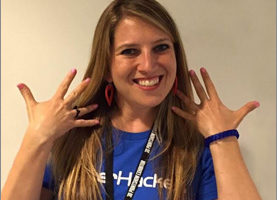
Smartphones are everywhere these days; enter a waiting room or a public bus and you can probably bet that over 50% of the people around you will be tuned in to their phones and tuned out of the world that surrounds them. The ability to acquire so much info at the touch of button is unprecedented in human history, and undoubtedly has a positive impact on our lives in some ways. However, there are also drawbacks to this level of accessibility, such as excessive use that interferes with our productivity, focus, and even our sleep. Unfortunately, kids are no exception to this, which is disturbing to a lot of parents.
So, what’s the solution? The team at OurPact might just have one: a digital parental control app that allows parents to control which apps their kids use, how often they use them, and when they use them. The app also has a content filter, location tracking feature, and a system that detects certain keywords which are commonly found within certain categories of content—content most parents wouldn’t want their kids consuming.
This app isn’t just for parents who want to ensure that technology doesn’t interfere with their kids’ health, well-being, and education; it’s also for professionals and students who acknowledge the need to admit when enough is enough. It might possibly be the best screen time app for Android. Paige Mayer, Director of Communications at OurPact, joins the podcast today to give us all the details.
Richard Jacobs: Hello, this is Richard Jacobs with the future tech and future tech health podcast. I have Paige Mayer, she’s the director of communications at a company called Ourpact, ourpact.com. Paige Thanks for coming.
Paige Mayer: Thank you for having me. It’s a pleasure.
Richard Jacobs: What’s the premise of the company? What do you guys do?
Paige Mayer: So Ourpact is a digital parenting app. What it’s most commonly known for is it allows parents to set limits around children’s mobile devices. So specifically app use, in addition to that we have web filtering and location monitoring as well.
Richard Jacobs: Well I have three teenagers and it’s a constant battle to tell them, get off the phone, put the phone down, don’t walk down the stairs with the phone. So I know what you mean. What are some typical guidelines that you’ve seen users put in place that is effective?
Paige Mayer: That’s a great question. No two kids are going to have the same rules and that’s something that we really encourage. The restrictions that you set up will really depend on the age of your child, what their interests are. Just generally what their schedule is looking like. But typically what we see is parents setting up definitely bedtime block schedules, so that makes sure that apps aren’t available after bedtime. And a lot of parents also use our allowance features so that kids throughout the day will only have access to apps basically when parents say that it’s okay. And they can play and pause that time throughout the day. So it’s really teaching them to be responsible with their own devices. In addition to that, you can set up app rules. So, of course, there’s a certain application, let’s say your child has a health issue and you want to have health-related apps always available on your child’s device or their educational apps that you want available during school hours or homework time. But you don’t want social media and games. You can actually customize what is available and when using the app.
Richard Jacobs: I figured you’d have many users over time that gave you feedback on what works and what doesn’t, et cetera. So any guidelines on best practices?
Paige Mayer: Yeah, I mean we definitely do take the feedback that parents provide to us and we try to bake that feedback directly into the application. We’ve been on the market for about five years and during that time we’ve really listened to what our users are asking for and we just basically develop our roadmap around that. But some specific tips that come to mind setting the app stores always blocked so that then that way if you know that your kid wants to install a new app, they’re going to have to come to you and say, Hey mom, dad, I want to install this new app. And then in the app or in our pack, do you actually unblock the app store so that you have that conversation with your child about, okay, what’s this install this app you want to install? What is it used for? And you’re actually directly involved in that process and you know what your child is doing with the device.
Richard Jacobs: That’s a good idea. Yeah, that makes sense. Is there any way to identify communications that your child gets possibly from bad actors somehow, incoming texts that happen after midnight or keywords and texts or things like that? Is there any advanced filtering that can be done like that?
Paige Mayer: That’s a really good question. At this time we don’t have contact filtering built-in with our pack, but we have been working on another solution called the view that we’re actually hoping to integrate into our packs in the nearish future. And what that does is it takes automated screenshots of children’s devices and then basically scans those screenshots for specific keywords that fall into categories of profanity, violence, sexuality drugs. And then they will actually inform parents, Hey, something came upon your kid’s device that you need to be aware of and then parents can take a look from there.
Richard Jacobs: Yeah, well that makes sense. What about just the time of usage? I guess this probably may be an easy one to solve. The phone just stops working after a certain number of hours used or the duration of a single session.
Paige Mayer: So it depends on how the app rules are actually set up, but if you don’t have allowance enabled then basically it’s just automated block schedules or on-demand blocks. So if you’ve set up a schedule in your parent app, then the device will automatically block during those times. On iOS child devices apps completely disappeared. On android child devices the apps just can’t be launched. Whereas if allowance is being used, then kids are the ones that are responsible for unblocking their own apps using their allowance timer. And so if their allowance time for the day expires, then their apps will automatically block.
Richard Jacobs: Okay, interesting. How do the kids react? I know in some ways it doesn’t matter because it’s for them, but anyways like let’s say you have a kid that just has been using the phone however they like and you want to introduce this. How do you do it in such a way with it out like they don’t go crazy on you and they acclimate to it?
Paige Mayer: Yeah, that’s a great question. Really it comes down to consistency. As a parent, I’m sure you realize that children really do thrive off of structure and consistency. And so maybe there’ll be a little bit of push back when you first introduced the application. But as long as it happens in tandem with a conversation we find that it doesn’t really, it’s not an issue long-term and that’s something we really do encourage because if you sit down with the child and say, hey, you have a mobile device, this is a huge privilege and I’m trusting you to have this device. But it comes with responsibility. And just because you own this phone doesn’t mean that you have unlimited access to apps and social media and games at all times. Why do you think it’s important to have some restrictions and balance around screen time and you actually engage your child in that conversation so that they understand the why behind your setting those limits rather than just enforcing those limits without any conversation. And then actually creating the rules. And this will depend on the age of the child, but creating those rules with your child. So, okay. What do you think is a reasonable allowance to have in place for weekdays? How about the weekend? What kind of schedule block do we want to create together and then actually doing that, it’s more of an agreement rather than these imposed limitations and rules.
Richard Jacobs: It’s interesting. Any stories that you’ve gotten from parents or the kids themselves that surprised you or delighted you or you thought were really cool?
Paige Mayer: Yeah. I mean we hear a lot of course from parents who just love the app. They talk about how big of a difference it’s made for them. Specifically, we even have actually reviews that are shared from children who say this app is a little bit annoying, but at the end of the day, I’ve seen an improvement in my grades. And overall I’ve just seen an improvement in my life since I’ve been using this app because I’m not spending as much time playing these games. I’m out playing with my friends instead. We also have a lot of support from parents of children with disabilities. And it’s just really helpful for them having that technology enforced the limits. And again, having no structure around it so that it’s not just sporadic and you don’t need to have arguments every single time. It’s just a clean cut.
Richard Jacobs: Yeah. That’s great. Again, any particular stories of amazing things that have happened because of the app? Something like the app helps the family to get over a crisis or a problem or anything. Anything that sticks out at you?
Paige Mayer: That’s just a consistent theme we hear from a lot of parents who say two weeks ago we were fighting every single day about screen time. And as soon as we installed this app, it’s like everything changed. We had peace, there were no more arguments. The kids are going to bed, they’re waking up and they’re not tired. We have our Sunday family time and everyone, we blocked the devices and the parents will set their devices away as well. And everyone’s just hanging out. Nobody’s looking at their screens. And it’s really hard. I mean, in this day and age, everyone’s busy. And so to really find those moments to connect and not be distracted, it’s rare, so you have to be really conscious about it. But an app like Ourpact, It definitely helps.
Richard Jacobs: Yeah. I have noticed like just for myself, if I’m sitting there and my phone is not in my hand, but let’s say it’s sitting on the desk, but it’s turned up where I can see the screen, it still pulls at me, things like turning the phone over so it’s facing downwards help. I guess what I’m saying is I’ve discovered the nature of phones is so addictive that it’s just incredible the power it has.
Paige Mayer: Yeah, it really is. And it’s interesting because we have parents who will install management on their devices. So they’re saying, I’m setting up these rules for you, but I want you to know that I’m setting them up for myself as well. So this is a problem everyone’s experiencing. We have students who use the app. We have professionals who use the app. There’s really no limit. It is developed for the family environment, but it’s used way beyond that. And it’s interesting that you bring that up, just sort of the psychology of the device because specifically with kids as we know, they don’t have that self-regulation that we have and it’s something that we’re struggling with. So if you’re struggling, I’m struggling and we’re adults, you think about a seven-year-old kid whose prefrontal cortex isn’t even developed yet. They don’t have that self-management. It’s going to be 10 times harder for them to say, I’ve been on Instagram for half an hour. I should probably put my phone away.
Richard Jacobs: Yeah, definitely. Are there any templates that you’ve used? Like a sample one, maybe like, after 10:00 PM the only functionality of the phone is resident apps and there’s no internet usage or no phone usage or if you designate a dinnertime setting then for the next 40 minutes like the phone is completely unusable. Anything like the preprogrammed stuff?
Paige Mayer: Yeah. So when parents first set up their account, every account comes with a default bedtime schedule for their children. We don’t really try to customize too much beyond that. We have recommended allowance times, but beyond that, not really. One thing that does come to mind though is that we have a family contract that we encourage parents to use with their kids when they first sign up for the app. And so that’s basically just a PDF that they can print out and it has a list of rules basically that’s saying, not only do I agree to adhere to these rules that you’ve set up for me with Ourpact, but it goes beyond that, if I see something that makes me feel uncomfortable online, I’m going to come and talk to you about it and let you know I’m not going to be mean to other people online. I would never say anything online that I wouldn’t say to someone in person and just setting those, that foundation for young kids to be responsible digital citizens because it really does go beyond just setting those limits around when apps can be used to who you are, when you have access to those apps and what you’re doing when you are online.
Richard Jacobs: Okay. Makes sense. Any difficulty that parents have when they first broach the subject? I mean, do you have any sample, maybe its silly scripts or recommendations from when you talked to your kids, like what to say, what not to say to make this effective.
Paige Mayer: Yeah, we do. And it’s going to vary by age depending on if you have a four-year-old kid versus a fifteen-year-old kid, that conversation is definitely going to be different. And it’s specifically with regards to how collaborative it is. But yeah, we definitely encourage parents to steer away from using the app in a controlling way and really encouraging that dialogue. So this is explaining why you’re installing it. Again, making sure that you’re creating those rules with your kid, not just independently and then blocking their device. And like hahaha, I just set up this app and you didn’t even realize it. We don’t want to surprise them. They should know what’s happening. And why. So that’s definitely key and we really do encourage that.
Richard Jacobs: And what’s the future of the app? What do you see as next?
Paige Mayer: That’s another great question. So I think I’ve mentioned this earlier, but we’ve been working on another program called the view that’s diving a little bit more into the intelligent insights side of things and reporting. And so we’re hoping to continue developing that solution and potentially adding it into Ourpact, which is one of the main things that our team is focusing on right now. In addition, we have some other really cool ideas for location-based rules, for example. So if a kid is arriving at school, all of the apps except for educational apps and maybe a messaging app that they use to communicate with their parents would block. Or if they get to a tutor’s house then everything is blocked or after bedtime, everything is blocked. It kind of just depends on where they are, what schedule is kicking in and the application would intelligently determine the device status from there.
Richard Jacobs: Okay. That makes sense. Like when you brought up, kids being tired and all that, we set up like a charging station at night, because my daughters would have their phone in their room and I would peak in and I can see the light and they try to hide it and I am like put that way. What we did is we did a charging station downstairs. So at like 10 o’clock, everyone’s got to put their phone there and that’s it because the temptation was just too great to use it. But this would help too. This would be really good.
Paige Mayer: Yeah, definitely. And that’s a very common tactic that parents use. And we even encourage parents who have Ourpact installed to continue doing that if it’s working. Cause it certainly makes sense and for adults as well.
Richard Jacobs: Okay. Well, excellent. Is it available on iOS and Android and what’s the best way for people to get the app?
Paige Mayer: So we offer management of iOS and Android child devices and our parent app can be installed in the iOS app store or the Google play store and parents can also sign up for accounts at our website, which is ourpact.com.
Richard Jacobs: Okay. Very good. Any other last personal message you want to give or any advice or thoughts you want to tell parents listening?
Paige Mayer: I mean the main thing that I really would drive home is that parents, a lot of parents would just think, I don’t want to be so controlling and I want to have this trust with your kid. And they misinterpret our solution as being almost overbearing when it really isn’t so much about that. Every child should have limits set up around technology. And along with those limits, there should be that conversation. It’s just one way to make the whole process easier, to automate it, to hold everyone accountable to the agreements that they have in place. Cause this is a problem undeniably. And it’s something that moving forward parents are going to need to be thinking about it just like teaching your child to ride their bike or tie their shoelaces. You need to teach your child how to be responsible for technology and using technology.
Richard Jacobs: Okay. Excellent. Well Paige, thank you for coming. I appreciate it. It’s been a good call.
Paige Mayer: Yeah, definitely. Thank you for having me.
Podcast: Play in new window | Download | Embed











